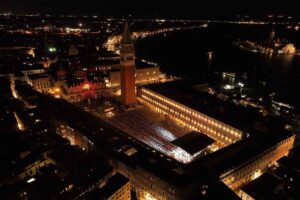The monatti were the workers who in times of epidemic were in charge of collecting and transporting sick or dead patients to the lazaret. Usually, the monatti were people sentenced to death, imprisoned, or people cured of the disease and so immune to it. In Venice they were called “pissigamorti“.
The masked men who moved about the city in their long, tarred black cloaks with gloved hands and bells at their ankles to herald their approach, the men who collected the plague-ridden bodies to be buried or burned in mass graves. The strange white hooked-nose masks worn by the pissigamorti contained aromatic herbs to counteract the sickness, and were necessary to keep the disease away.
In the novel “I Promessi Sposi” (The Betrothed) the writer Alessandro Manzoni also tells the story of the pissigamorti at the time of the plague of the 600. We read their stories, maybe we saw them in some films, we watched them trying to imagine what they felt. But we never thought we would feel that excruciating pain in our time, that sense of total impotence like seeing those military trucks going in single file during the current coronavirus pandemic. Sooner or later it will end and something will stay with us, inside us: the endless pain of the new pissigamorti on the military trucks.






